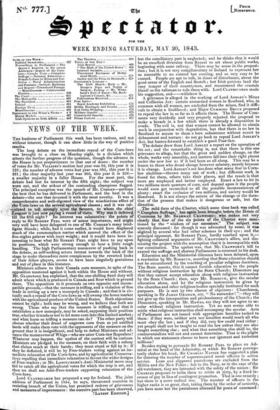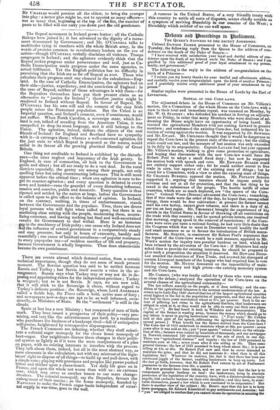NEWS OF THE WEEK.
THE business of Parliament this week has been various, and not without interest, though it can show little in the way of positive results.
The long debate on the immediate repeal of the Corn-laws was brought to a close on Monday night, in a division which attests the further progress of the question, though the advance in the House is not proportionate to that out of doors : the number of votes for Mr. VILLIERS'S motion last year was 92, this year it is 125; the number of adverse votes last year was 395, this year it is 381; the clear majority last year was 303, this year it is 256- a smaller majority in a fuller House. For the most part, the debate had lost its interest by the fifth night ; the subject was
worn out, and the ardour of the contending champions flagged. The principal exception was the speech of Mr. COBDEN—perhaps the best that he has delivered in Parliament, and the best in the debate—the one that invested it with the most novelty. It was a comprehensive and well-digested view of the mischievous effect of the Corn-laws on the several agricultural classes ; and it was cal- .cailated to tell strongly upon the farmers, to whom the chief Leaguer is just now paying a round of visits. Why was it deferred till the fifth night ? Its interest was substantive : the points of reply to Sir ROBERT PEEL were of minor importance, and might very well have been delegated to one of Mr. COBDEN'S many intel- ligent friends; while, had it come earlier, it would have displaced much of the commonplace matter which marred the effect of the five-nights palaver with inert weight ; and it would have been in- teresting to hear what Sir Rosser PEEL might have to say upon its positions, which were strong enough to bear a little rough handling. The high Parliamentary manceuvre of pushing back in the debate, as self-seeking actors retreat towards the back of the stage to make themselves more conspicuous by the reverted looks of their fellow players, seems to have been singularly gratuitous and out of place in this instance.
Ministers adhere to their Canada corn measure, in spite of the
opposition mustered against it both within the House and without. Mr. GLADSTONE has explained, that the one-shilling fixed duty will admit wheat which is produced in Canada and flour which is ground there. The opposition to it proceeds on two opposite and incom- patible grounds,—that the measure is trifling, and a violation of free trade in setting up a new a monopoly in Canada ; and that it is vir- tually such a repeal of the Corn-laws as will swamp the home market with the agricultural produce of the United States. Both objections cannot be right ; both may be wrong, and we believe that both are wrong. Those who say that the measure is trifling, and that it establishes a new monopoly, may be asked, supposing their position true, whether it tends or not to let more corn into this limited market ; and what harm so trifling a measure can do ? The other party will choose whether their dread of ungrown corn from as yet unfilled lands will make them vote with the opponents of the measure on the ground that it is insignificant, and help to defeat Ministers and ad- vance the manceuvres of Whigs—who are utter Corn-law Repealers ! Whatever may happen, the upshot of the contest will be curious. Ministers are pledged to the measure, on their faith with a colony that claims much at their hands ; they must stand or fall by it : if they be defeated, it will be by Free-traders voting against an im- mediate relaxation of the Corn-laws, and by agriculturist Conserva- tives repelling that immediate relaxation to favour the wider designs of Free-traders ; or Mr. LABOUCHERE'S Anti-Ministerial move may fail to catch all the agricultural votes for which the trap is set, and then we shall see Anti-Free-traders supporting relaxation of the Corn-laws.
Lord CLANRICA.RDE has proposed a sop for Ireland. The joint address of Parliament in 1834, he says, threatened coercion in resisting breach of the Union, but promised redress of grievances and measures of improvement : the coercive part has been observed, but the conciliatory part is neglected ; and he thinks that it would be an excellent diversion from Repeal to set about public works, beginning with some railway. There may be sense in the proposi- tion; but it is not very complimentary to Ireland to represent her as amenable to no control but coaxing, and so very easy to be coaxed. People are apt to talk, in times of disturbance, about the good sense of the English and Scotch ; but Irish patriots laud the easy temper of their countrymen, and recommend the crust:11a Nandi as the talisman to rule them with. Lord CLANRICARDE made his suggestion, and—withdrew it.
A grievance is alleged in the working of Lord ASHLEY'S Mines and Collieries Act : certain unmarried women in Scotland, who, in common with all women, are excluded from the mines, find it diffi. cult to obtain a livelihood ; and Major CUMMING Banes proposed to repeal the law in so far as it affects them. The House of Com- mons very decidedly and very properly rejected the proposal to make a breach in a law which there IS already a disposition to evade. The evil is, not that women cannot be allowed to obtain work in conjunction with degradation, but that there is no law in Scotland to secure to them a bare subsistence without resort to debasement and torture : do not go back to repeal Lord ASHLEY'S Act, but hasten forward to establish a good Poor-law. The debate drew from Lord ASHLEY a report on the operation of his act ; and the remarkable thing is, not that there is this one grievance to allege, but that the great and sudden change, on the whole, works very smoothly, and matters fall into their right places under the new law as if it had been so all along. This may be a lesson to those who dread change however salutary, merely because it is change. Lord ASHLEY'S act has done what many fear in Corn- law abolition—thrown many out of work ; but different work is found for them, others take their places' and the result is that more are employed and better employed. Enact a law to let in two millions more quarters of corn, and depend upon it the people would soon get reconciled to all the possible inconveniences of plenty : enact the exclusion of two millions, and society would be dissolved. It is not always the extent of the change or the dura- tion of the process that makes it dangerous or safe, but the direction.
The mild form of the-Charter, which some time back was called. "Complete Suffrage_„" has again been brought before the House of Commons by Mr. SHARMAN CRAWFORD ; who makes out very clearly that four of the six points of the Charter were sanc- tioned by the "wisdom of our ancestors." The subject was- scarcely discussed : for though it was advocated by some, it was slighted by several who had other schemes in their eye ; and the principal opponent, Sir Rosser PEEL, hardly touched upon it,— fighting collateral arguments of Mr. CRAWFORD'S allies, and dis- missing the project with the assumption that it is incompatible with our constitution. The upshot was, that Mr. CRAWFORD'S bill to extend the suffrage and shorten Parliaments is returned to his desk. Education and the Ministerial dilemma have been debated, upon a resolution by Mr. ROEBUCK, asserting that State education should. not be encumbered by the teaching of peculiar religious doctrines. The State asserts, that it cannot furnish education to the people without religious instruction by the State Church ; Dissenters say- that they cannot accept education along with religious instruction by the State Church ; then, says Mr. ROEBUCK, give the secular education alone, and let the religious instruction be given by the churches and other religious bodies specially instituted for such purposes. He is met by two classes of objectors : Churchmen, speaking in Sir JAMES GRAHAM, cry, "No surrender ! "—they will not give up the interposition and predominancy of the Church ; the Dissenters, speaking in Mr. HAWES, say they will not agree to se- cular without religious instruction. Yet no sect seems able to settle what religious instruction shall accompany the secular. Acts of Parliament are not issued with appropriate homilies tacked to them : if they were, neither acts nor hotailies would reach all who must obey the law' and if they did, very few could read either : yet people shall not be taught to read the law unless they are also taught something else ; and what that something else shall be, the controversialists will not and cannot determine. That is the plight in which our statesmen choose to leave our ignorant and turbulent millions I Besides trying to persuade Sir ROBERT PEEL to place an Ad- miral at the head of the Admiralty, at which Sir ROBERT peremp- torily shakes his head, Sir CHARLES NAPIER has suggested a plan for thinning the number of superannuated naval officers in active service. Lean and slippered pantaloons are excluded from the Militia and the New Police ; but in the Navy, as in the case of the old watchmen, they are intrusted with the safety of the nation : Sir CHARLES proposes to bribe them to retire at sixty, by a fixed in- crease of pay in lieu of contingent promotion. That is one remedy ; but there is a more radical one. The number of officers in the higher ranks is so great, that, taking them by the order of seniority, you have none but the pantaloons aforesaid for posts of command : Sir CHARLES would pension all the oldest, to bring the younger into play : a better plan might be, not to appoint so many officers— not so many that, beginning at the top of the list, the number of posts to be tilled will not carry you down past the old gentlemen.



























